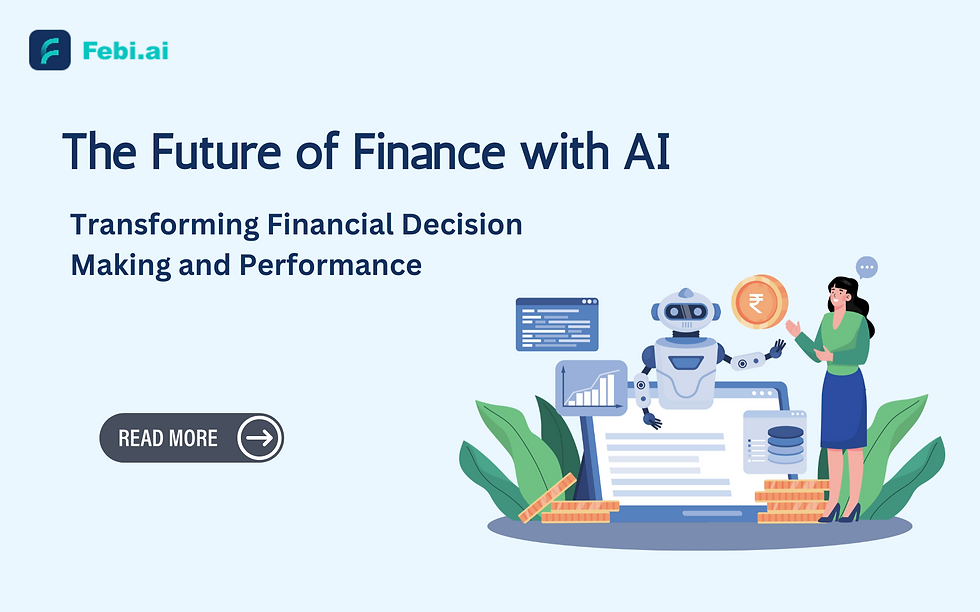The Future of Finance with AI: Transforming Financial Decision Making and Performance
- Riya Aggarwal

- Jan 30, 2025
- 3 min read
Introduction
Artificial Intelligence (AI) is revolutionizing the financial industry by enhancing decision-making, improving financial performance, and reshaping fintech innovations. The integration of AI in finance is enabling businesses and individuals to make more informed decisions, streamline operations, and predict market trends with greater accuracy. In this article, we will explore how AI is driving financial decision-making, improving performance, and shaping the future of fintech.

AI for Financial Decision Making
AI-powered solutions are transforming how financial decisions are made by providing real-time insights, predictive analytics, and automated processes. Here’s how AI enhances decision-making in finance:
1. Predictive Analytics for Market Trends
AI analyzes historical data to predict stock market movements, investment opportunities, and economic shifts.
Machine learning models help investors and financial analysts make data-driven decisions.
2. Risk Assessment and Management
AI detects potential risks by analyzing transaction data and financial history.
Automated risk management systems prevent fraudulent transactions and enhance compliance with regulatory standards.
3. Automated Portfolio Management
Robo-advisors leverage AI algorithms to optimize investment portfolios based on risk tolerance and financial goals.
AI-driven asset allocation ensures better financial performance with minimal human intervention.
Improve Financial Performance with AI
AI-driven financial tools enhance performance by optimizing processes, reducing operational costs, and increasing revenue opportunities. Here’s how AI improves financial performance:
1. Enhanced Financial Forecasting
AI algorithms analyze large datasets to provide accurate revenue and expense projections.
Predictive modeling helps businesses plan budgets more effectively.
2. Cost Reduction and Efficiency
AI-powered automation reduces manual tasks, such as data entry and financial reporting.
Intelligent process automation (IPA) streamlines workflows, reducing errors and inefficiencies.
3. Customer Personalization in Banking
AI analyzes customer behavior to offer personalized banking and financial services.
Chatbots and virtual assistants improve customer engagement and satisfaction.
AI in Fintech: Transforming the Financial Landscape
Fintech companies are leveraging AI to provide innovative solutions that enhance financial services. Here’s how AI is making a significant impact in fintech:
1. AI-Powered Fraud Detection
AI identifies unusual patterns and suspicious transactions, preventing cyber threats and financial fraud.
Real-time monitoring ensures secure online transactions.
2. Automated Loan Approvals
AI-based credit scoring models analyze borrower data to assess creditworthiness.
Faster loan processing and approvals improve efficiency in lending institutions.
3. Blockchain and AI Integration
AI enhances blockchain-based transactions by ensuring security and transparency.
Smart contracts powered by AI automate and streamline financial agreements.
The Future of Finance with AI
The future of finance will be driven by AI advancements that bring innovation, efficiency, and security to financial operations. Here’s what to expect:
1. Hyper-Personalized Financial Services
AI will enable banks and financial institutions to offer highly personalized financial advice and investment strategies.
Real-time insights will allow users to manage their finances more effectively.
2. Autonomous Finance
AI-driven financial management platforms will automate budgeting, investments, and expense tracking.
Businesses and individuals will rely on AI to make real-time financial decisions with minimal human intervention.
3. Advanced AI Regulation and Compliance
AI will assist regulatory bodies in monitoring financial markets and detecting non-compliance.
Enhanced AI models will ensure ethical AI usage in the financial industry.
4. AI-Powered Financial Inclusivity
AI will provide accessible financial services to underserved populations through mobile banking and microfinance solutions.
AI-driven credit scoring models will offer loans to individuals with limited financial history.
Conclusion
AI is reshaping the finance industry by enhancing decision-making, improving financial performance, and driving fintech innovations. As AI continues to evolve, the future of finance will be characterized by automation, personalization, and security. Businesses and individuals must embrace AI-driven solutions to stay competitive and unlock new financial opportunities. The future of finance with AI is promising, offering unprecedented efficiency and accessibility in financial services.



Comments